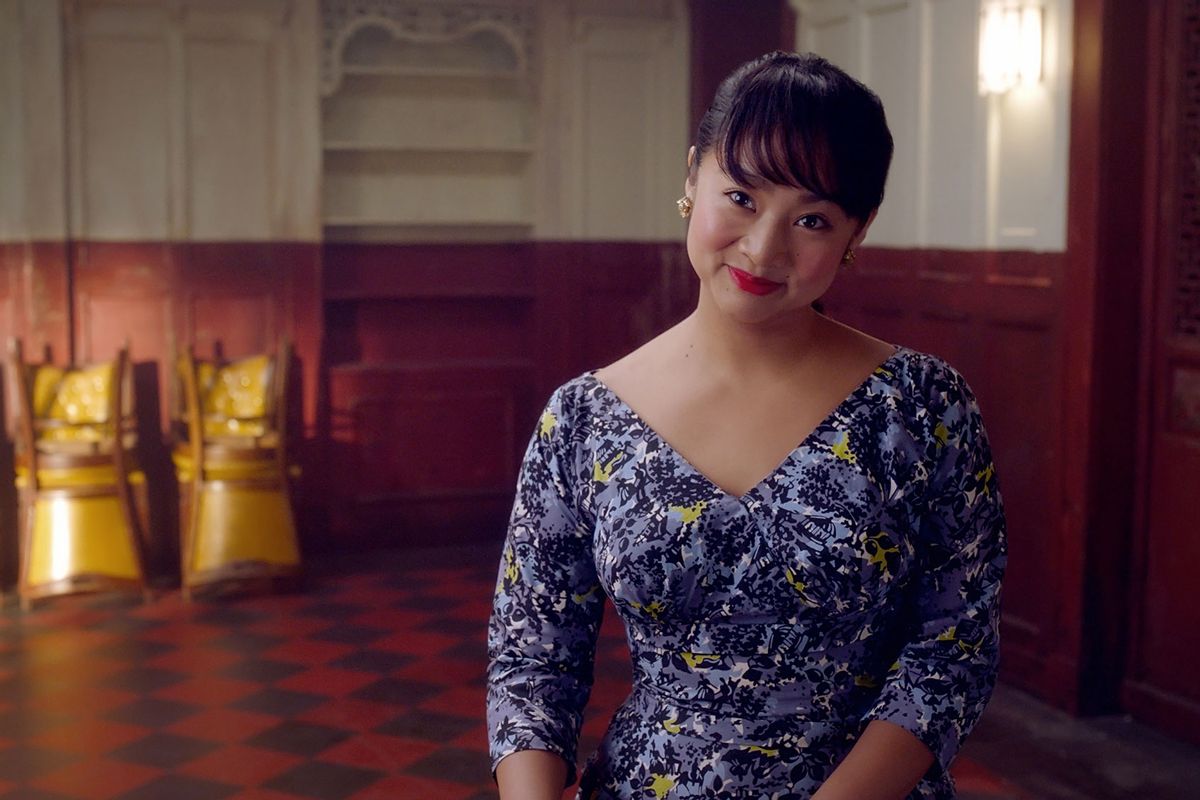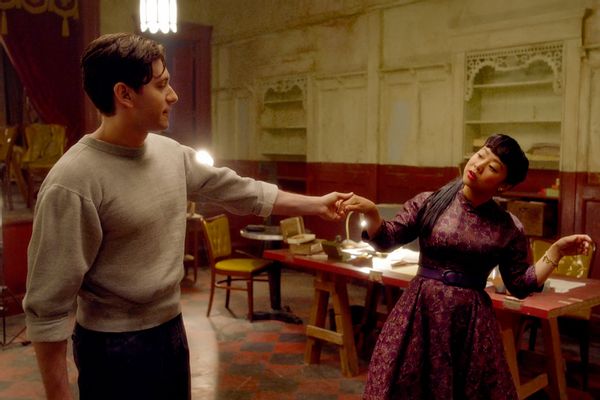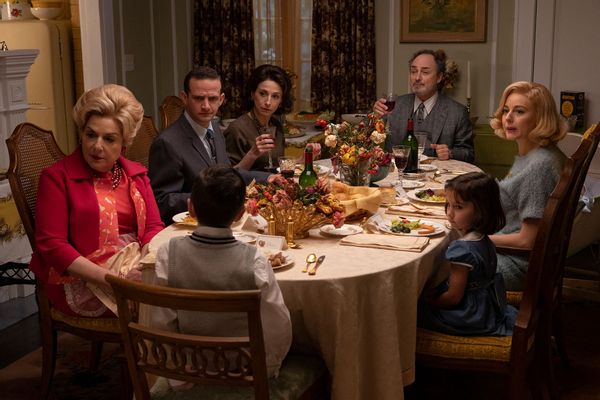


As soon as she announced she was pregnant, the dread set in. Prime Video's "The Marvelous Mrs. Maisel" primarily takes place in the late 1950s and '60s New York. The character Mei, played splendidly by Stephanie Hsu, has always been vibrant, intelligent and ambitious on par with Rachel Brosnahan's Midge, a rising comic in a field of dismissive men.
Mei is an aspiring doctor, a daunting feat for any woman of the era, but especially for a woman of color. The book "Women Physician Pioneers of the 1960s" describes women in the medical field as "nearly invisible in the United States of the mid-1960s." And Mei is Chinese-American, unmarried and in a relationship with divorced dad of two Joel (Michael Zegen), who hasn't even introduced her to his parents.
As our real world slips further into post-Roe darkness, is the show's treatment of abortion an actual bright spot?
Pregnancy complicates things, for both of them. Historically, Joel has not been known for supporting women's dreams, especially if they at all infringe upon his own. His anger about his then-wife Midge first daring to be a comic — and even worse, daring to be really, really good at comedy — is partially fueled by his own thwarted and unrealistic dreams of the spotlight. Joel doesn't want to be a doctor like Mei, but he also doesn't have the same vision for the future that she has. Hers is more realistic, understanding the struggles they will face and the burdens that she alone as a mother would bear. And by the first episode of the fifth season, Mei isn't pregnant anymore.
Abortion has come to "Mrs. Maisel," a pretty world of matching hats to dresses and gloves to hats, and tea cakes, and little concern about childcare, rent or equity. How does the show handle the abortion storyline? Is it realistic? And as our real world slips further and further into post-Roe darkness, is the show's treatment of abortion an actual bright spot?
Mei has an abortion in a pre-Roe world. In 1960s New York, abortion was not legal. That doesn't mean it wasn't accessible, but it was dangerous. According to the Guttmacher Institute, "the number of illegal abortions in the 1950s and 1960s ranged from 200,000 to 1.2 million per year." Doctors had been persecuted for performing abortions in the 1940s and '50s, which meant that fewer skilled practitioners would be willing to risk their careers for the procedure. Hopkins Bloomberg Public Health reports fear of persecution "drove the practice underground and into less skilled hands," and in 1965, around the time Mei would have had an abortion, "17% of reported deaths attributed to pregnancy and childbirth were associated with illegal abortion."
As a woman of color, Mei is at a higher risk of complications, even death. According to the Guttmacher Institute, "Abortion accounted for one in two childbirth-related deaths among nonwhite and Puerto Rican women," specifically in 1960s New York City.
Midge speaks in modern parlance, "That's not fair. She chose."
Mei is in medical school, which might mean that she could potentially have access to more of a health professionals network than the average woman at the time. But Mei doesn't say how or where her abortion was obtained. She also doesn't tell Joel about it until afterward. Joel, predictably, doesn't handle it well.
His first response is confusion, then when the abortion dawns on him, anger flashes across his face. His sympathetic expression shifts to smug dismissal. "Oh s**t," he says flatly. "If you were going to do this, why the hell did you tell me you were pregnant in the first place? I mean, since I don't matter in the equation." He then starts cursing about his relationship history and insults her with sarcasm. Keep in mind, Joel has still not introduced her to his own children at this point. They refer to her as "a lady."
 Michael Zegen (Joel Maisel) and Stephanie Hsu (Mei) in "The Marvelous Mrs. Maisel" (Amazon Studios)But Joel accepts the abortion — or pretends to — faster than the Joel of previous seasons would have. Still, his anger is right there, barely below the surface. He tells Mei to get her things pretty quickly after that, shows up extraordinarily drunk to his own bar, hitting on random women with dates and attempting to do a hammered, horrible comedy set, just like the old days! He insults the band, largely made up of Black musicians, waxes poetically about Midge's breasts, then goes after Mei's relatives. As Zegen told Entertainment Weekly, "Every season Joel gets into a situation where he either gets punched or he punches somebody." Sounds like a personal problem.
Michael Zegen (Joel Maisel) and Stephanie Hsu (Mei) in "The Marvelous Mrs. Maisel" (Amazon Studios)But Joel accepts the abortion — or pretends to — faster than the Joel of previous seasons would have. Still, his anger is right there, barely below the surface. He tells Mei to get her things pretty quickly after that, shows up extraordinarily drunk to his own bar, hitting on random women with dates and attempting to do a hammered, horrible comedy set, just like the old days! He insults the band, largely made up of Black musicians, waxes poetically about Midge's breasts, then goes after Mei's relatives. As Zegen told Entertainment Weekly, "Every season Joel gets into a situation where he either gets punched or he punches somebody." Sounds like a personal problem.
Midge understands much quicker about the abortion and she takes it more in stride, though her character's default — blame someone else! — switches on immediately. "She wasn't ready," Midge says knowingly (and judgmentally). But when Joel turns his accusations on her, that talking with Midge somehow tipped Mei's decision, Midge speaks in modern parlance, "That's not fair. She chose."
 The Marvelous Mrs. Maisel (Philippe Antonello/Prime Video)
The Marvelous Mrs. Maisel (Philippe Antonello/Prime Video)
To simply accept the abortion is a surprisingly progressive move for the show.
When Joel at last tells his parents that Mei isn't going to have a baby anymore, his mother Shirley (Caroline Aaron, in a powerhouse performance) is sympathetic at once. She also misunderstands. "She lost it?" Shirley asks, her hand over her heart and her ordinarily gruff voice soft and caring. Shirley is a force, but when you need love, she is there. No judgment, only grandmotherly hugs, snacks and a tornado of empathy. Joel lets her and his father (Kevin Pollak) think that it was a miscarriage, and that the event has broken him and Mei up.
At first, the abortion storyline on "Mrs. Maisel" feels like a whirlwind. No one presses for details. No one wants to know when or where or how, or even if Mei is OK physically. (Statistically speaking, at the time she may not have been.) But refusing to linger on it, or to dwell in sorrow or any negative emotion, to simply accept the abortion is a surprisingly progressive move for the show. It's a simple fact. Mei had an abortion. We don't need to say more or make it a big deal because it isn't.
Want a daily wrap-up of all the news and commentary Salon has to offer? Subscribe to our morning newsletter, Crash Course.
"Mrs. Maisel" has always taken a refreshingly different view of motherhood. Being a mother doesn't complete Midge. She doesn't feel actualized or satisfied as a person solely staying at home and being a caregiver and homemaker for the children she had quite young and the (cheating) husband she married young. "Mrs. Maisel" has never idealized motherhood the way that so, so many other shows and fictions do. They've never pretended that women can have it all.
And this season, Mei spells it out, plainly. "I can't have it all, Joel. The world doesn't work that way." It especially won't work that way for women like Mei, who doesn't have the wealth and white privilege of Midge. Abortion's appearance on "Mrs. Maisel" and the treatment of the storyline only prove its normalcy as an aspect of many people's lives, much in the way parenthood is.
"The Marvelous Mrs. Maisel" releases new episodes Fridays on Prime Video.
Read more
about "Mrs. Maisel"
